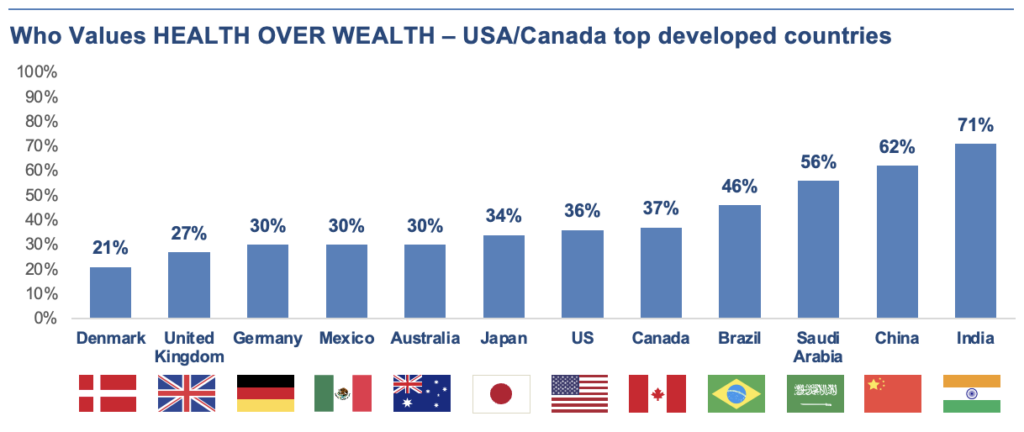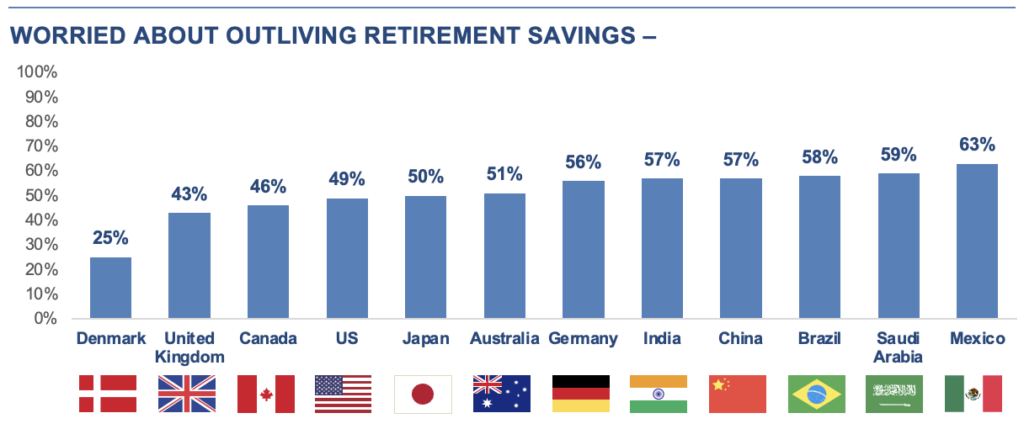Millennials & Gen Z Value Health Over Wealth
9 April 2025 – NYC — In the world’s first ever global study on workplace wellness and longevity, young Americans reveal that it’s not all about the money with half of millennials and Gen Z , (43 years and under) saying they would accept a lower salary if their employer provided support for their wellbeing.
With a population of 72 million, millennials account for more than a third of the U.S. workforce, and are known to switch jobs more frequently, and feel less company loyalty than previous generations. In comparison, only about a fifth of Americans in their 60s and 70s, (baby boomers, 20%) prioritized wellbeing over their salaries.
In the landmark study known as the Global Longevity Study released in the USA today, 14,000 men and women in 25 countries worldwide, responded on how they perceive their lifespan, prioritize their health, and navigate obstacles to achieving a longer, healthier life. The longevity study was jointly conducted by the Oxford Longevity Project (OLP) in Oxford, England, and Roundglass, a Seattle-based organization dedicated to transforming global wellbeing.
“We found that mental health is one of the top three priorities of people worldwide today,” says Gurpreet “Sunny” Singh, founder of Roundglass who initiated the study.
“Employees don’t want to sacrifice their wellbeing for a job and If employers don’t address this issue, it’s going to hurt the company’s bottom line. To attract and retain talent, placing importance on employee mental health is non-negotiable.” In addition to mental health, the far-reaching study, conducted in spring 2024, also revealed that physical health and financial security were top priorities for people worldwide.
But it’s not only American workers who prioritize their wellbeing over their salaries. Nearly three-fourths of Egyptians (73%), followed closely by India (71%) prioritized wellbeing over salary; the majority of Chinese respondents (62%) felt the same. Two of out of five Taiwanese respondents (42%) preferred salary over wellbeing provisions, followed closely by Mexico and Costa Rica (both 41%) and Australia (40%)
When choosing a new job, workplace benefits for one’s physical health are an important consideration for most North American respondents. Nearly 70% of Canadians polled showed a strong reliance on employer benefits while 61% of American respondents considered employer benefits supporting health to be important or very important.
Of the various age groups, 67% of American millennials prized physical health benefits the most, whereas only 57% of baby boomers or Gen Z respondents were in agreement. “It’s the great irony of longevity,” says Leslie Kenny, co-founder of the Oxford Longevity Project and founder and CEO of Oxford Healthspan, a nutraceutical company based in Oxford, England.
“Boomers and Gen X are the ones who most need to prioritize their health, yet it’s millennials and Gen Z who are leading the way in embracing true healthspan.”
“Younger generations are taking their health more seriously – not in spite of their age – but because they’ve watched their parents and grandparents live longer lives, often while managing chronic diseases,” says Kenny.
It’s no surprise that millennials – often regarded as the wellness generation – are focused on their health, having grown up with social media with an estimated 50,000 fitness influencers on Instagram and more than 300,000 fitness experts on Youtube.
When asked which sources Americans trusted most for health-related information – apart from doctors and medical professionals – nearly half of Gen Z (44%) respondents cited social media as did more than a third of millennials (36%). About one in five American Gen Xers (19%) cited social media as did only 7% of boomers.
Gen Xers and boomers can look to the younger millennial and Gen Z generations – who smoke less, exercise more and prioritize fruit and vegetables – for inspiration on how to live better. “It’s the younger, generally healthier generations who are leading the charge,” says Roundglass’ Singh. “Boomers and Gen X most urgently need to be proactive about their health and to take a page from the younger generations.”
Choosing a company that supported employees’ mental health was considered very important for nearly a third of the American millennials and for about a fourth of the U.S. Gen X and Gen Z generation respondents who participated in the survey.
“Work is such a big part of our lives, but for many it’s a stressful experience,” says Oxford Longevity Project co-founder, Leslie Kenny. “It’s clear that people expect employers to support their efforts to support themselves and improve their health.”
Regarding financial security, nearly three quarters of the Taiwanese respondents (73%) worried about running out of money in retirement, followed by Egypt, and Costa Rica and South Korea (all 65%). Indonesian respondents seemed to express the least concern with 25% followed by the United Kingdom (26%) and Denmark (34%).
More than half of Americans (54%), especially Gen X (54%), were concerned that they’d outlive their retirement funds, while Americans from the boomer generation were least worried (45%).
As American corporations such as JP Morgan Chase, Amazon, AT&T, Boeing, Dell Technologies and UPS demand employees return to work full-time, the difference in priorities among younger and older generations are becoming strikingly apparent.
JP Morgan’s recent full return-to-work initiative prompted thousands of disgruntled employees to sign a petition demanding better work conditions and requesting that the bank retain its hybrid-work model. In an employee town hall, JP Morgan CEO Jamie Dimon lashed out at the bank’s younger employees, particularly Gen Z, for not paying attention or for sending text messages while on work Zoom calls from their homes. “If you don’t think that slows down efficiency, creativity, creates rudeness, it does,” he told employees. “You have a choice. You don’t have to work at JP Morgan.”
Notes to Editors
About the Global Longevity survey
The Global Longevity survey, conducted in April and May 2024, covers attitudes, habits, hopes, and fears towards longevity across 25 markets, including the Blue Zones. It includes insights into government policy, finances, pensions, and community influences on longevity. The countries covered in the survey were: UK, USA, India, Canada, Australia, China, Indonesia, Finland, Japan, Costa Rica, South Korea, Mexico, France, Spain, Germany, Brazil, Greece, Italy, Denmark, Egypt, Saudi Arabia, Turkey, Taiwan, South Africa and UAE. The online survey was conducted in 25 markets to 1,000 adults aged 18+. The sample in each market was nationally representative based on interlocking age and gender quotas.
About Roundglass
Roundglass is on a mission to help people everywhere live better through Wholistic Wellbeing, a way of approaching wellbeing that guides every decision and, thus, becomes a lifestyle. The Roundglass Living app offers personalized support and research-backed practices to help users achieve wellbeing goals, big and small. The Roundglass Punjab Football Club and Roundglass Giving (which includes social impact initiatives like the Roundglass Foundation) share a common purpose: empowering people, enriching communities, preserving the planet, and elevating wellbeing globally.
https://roundglassliving.com
The Oxford Longevity Project
The Oxford Longevity Project mission is to make the latest breakthroughs & best practices in longevity accessible to all by bridging high science with actionable information for both medical practitioners and the public. For more information please visit: https://oxfordlongevityproject.org/about-us
Question – “I would prefer for my workplace to provide for my health and wellbeing even if it meant earning a lower salary?”

Source: The Global Longevity Study

Source: The Global Longevity Study

Source: The Global Longevity Study
Question – “I am concerned about outliving my retirement funds”

Source: The Global Longevity Study – those who responded strongly agree/agree

Source: The Global Longevity Study

Source: The Global Longevity Study